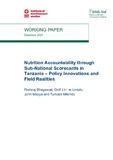Nutrition Accountability through Sub-National Scorecards in Tanzania – Policy Innovations and Field Realities
| dc.contributor.author | Bhagawati, Rishiraj | |
| dc.contributor.author | te Lintelo, Dolf J.H. | |
| dc.contributor.author | Msuya, John | |
| dc.contributor.author | Mikindo, Tumaini | |
| dc.coverage.spatial | Tanzania | en |
| dc.date.accessioned | 2021-12-09T13:05:52Z | |
| dc.date.available | 2021-12-09T13:05:52Z | |
| dc.date.issued | 2021-12-09 | |
| dc.identifier.citation | Bhagawati, R.; te Lintelo, D.J.H.; Msuya, J. and Mikindo, T. (2021) Nutrition Accountability through Sub-National Scorecards in Tanzania – Policy Innovations and Field Realities, Brighton: Institute of Development Studies, DOI: 10.19088/IDS.2021.067 | en |
| dc.identifier.isbn | 978-1-78118-899-6 | |
| dc.identifier.isbn | 978-1-78118-899-6 | |
| dc.identifier.uri | https://opendocs.ids.ac.uk/opendocs/handle/20.500.12413/16993 | |
| dc.description.abstract | Over the past decade, the Government of Tanzania has paid increasing attention to accountability in its nutrition policies. This has coincided with the introduction of truly innovative efforts to advance and monitor government action towards and accountability for nutrition at subnational level. A multisectoral nutrition scorecard (MNS) has been rolled out across all districts in the country, with quarterly updates on district performance. Moreover, a Nutrition Compact instrument was introduced to incentivise senior civil servants within regional and district administrations to advance efforts to promote nutrition. This paper explores how the government has used these initiatives to give accountability a particular form and meaning, pertinent to context. The paper analyses a series of policy documents and complements analysis this with field-based interviews with local officials across five regions. We find that the MNS and Compact are designed predominantly for internal purposes of government. This renders ‘accountability tools’ largely in the service of a centralised state, advancing vertical accountability. Such a narrow framing and design inhibits the potential of these instruments for galvanising social accountability, whereby citizens can hold public service providers and subnational government actors to account directly. | en |
| dc.description.sponsorship | Irish Aid, Government of Ireland | en |
| dc.language.iso | en | en |
| dc.publisher | Institute of Development Studies | en |
| dc.relation.ispartofseries | Working Paper; | |
| dc.rights | This is an Open Access paper distributed under the terms of the Creative Commons Attribution Non Commercial 4.0 International licence (CC BY-NC), which permits use, distribution and reproduction in any medium, provided the original authors and source are credited, any modifications or adaptations are indicated, and the work is not used for commercial purposes. | en |
| dc.rights.uri | http://creativecommons.org/licenses/by-nc/4.0/ | en |
| dc.subject | Nutrition | en |
| dc.subject | Politics and Power | en |
| dc.title | Nutrition Accountability through Sub-National Scorecards in Tanzania – Policy Innovations and Field Realities | en |
| dc.type | Series paper (IDS) | en |
| dc.rights.holder | Institute of Development Studies | en |
| dc.identifier.team | Rural Futures | en |
| dc.identifier.doi | 10.19088/IDS.2021.067 | |
| rioxxterms.funder | Default funder | en |
| rioxxterms.identifier.project | Default project | en |
| rioxxterms.version | VoR | en |
| rioxxterms.versionofrecord | 10.19088/IDS.2021.067 | en |
| rioxxterms.funder.project | 9ce4e4dc-26e9-4d78-96e9-15e4dcac0642 | en |
Files in this item
This item appears in the following Collection(s)
Except where otherwise noted, this item's license is described as This is an Open Access paper distributed under the terms of the Creative Commons Attribution Non Commercial 4.0 International licence (CC BY-NC), which permits use, distribution and reproduction in any medium, provided the original authors and source are credited, any modifications or adaptations are indicated, and the work is not used for commercial purposes.


